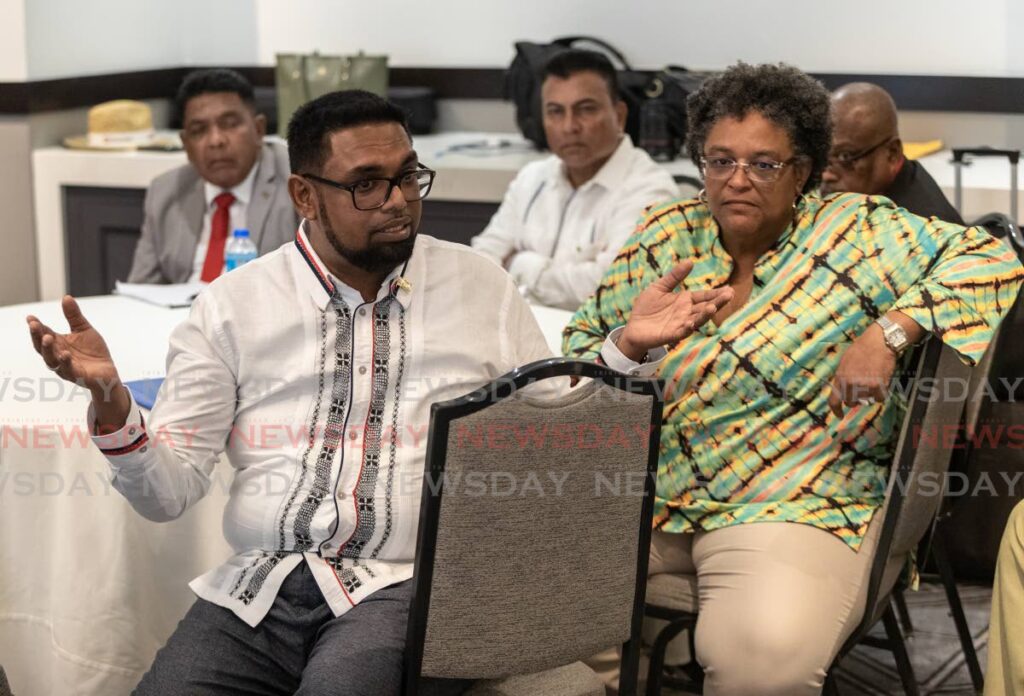Guyana, Barbados leaders: Invest more to make region sustainable

Caricom business leaders have been called on by the heads of government of Guyana and Barbados to invest more in the region to help it become more sustainable.
Dr Irfaan Ali and Mia Mottley raised the issue during discussions to reduce the Caricom import bill by 25 per cent by 2025 with private sector members at The Brix, St Ann's on Friday evening.
"We have to be able to put forward credible opportunities, and to ensure that we can secure the stability and then the prosperity for our region in a very uncertain world," Mottley said.
She said this was possible through import substitution and the mobilisation of capital, which will be addressed at the end of the month at a meeting of Caricom finance ministers.
"And hopefully, we can get a pathway to take in something that was literally laid on the books of Caricom Secretariat for more than a decade. Secondly, we need to be able to make sure that the US$100 billion in savings that exists in this region, now US$50 billion to private companies and the rest in the non-bank financial institutions, that we can find instruments to allow us to unlock that. Because with all due respect, there has to be diversity in terms of investment, and not just allowing our money to work through patient interest rates and savings."
Mottley said she plans to have Barbados move away from being known strictly for sugar and has determined to use renewable energy to stabilise a number of sectors.
"One of them, of course, is agriculture. Largely because unlike Trinidad and like Guyana, we do not have the benefit of the scale of production. But we need still to maintain a rural and ecological society if we are to keep our society stable. As a result, we, therefore, have to be able to look after not only our people, but create an export market. And we need to marry that opportunity with the logistics opportunity that God gave us when he put us where he did, geographically."
Ali also touched on the importance of investments. "I want us today to spend a few moments understanding the big picture and how to position your investment in line with the bigger picture, opportunities that will be created as a result of the opening up of the economy, expenditure, years of transformation, and doing the comparative advantage of all sectors. So that is what we're doing in a nutshell, in fact, to do the comparative advantage of all the sectors," he said.
Ali said part of Guyana's development includes building a new city – Silica City – which is the goal beyond the 2025 benchmark.
"We're looking for practical things, things that meet the development aspirations of our people, we're not going to build 100 flyovers, we do not need 100 flyovers, so we have made it very clear. In addition to this, we are very interested in Silica City. Now, why Silica City? As you know, 80 per cent of our population live on the coast. So we are building a new city that will be sustainable. This city will have a lot of different characteristics than the existing cities and cities as we know."
He said another development would be the construction of hotels and accomodation for those who are seeking it.
"We are now looking at investors coming in to build. In terms of rooms, we're having a serious problem with rooms now, a lot of investors out of Trinidad are trying to help us with that. We have at least three hotels that are being built by investors from TT. So the hospitality sector, the household building, a national training institution to train our young people to do the jobs of the future and what are the jobs in the future."
Ali said they are working on incorporating coding into primary and secondary schools. He explained that all levels in primary schools must be exposed to elementary training of coding and those in secondary schools must develop intermediate skills in software development.
"We're trying to position Guyana as a major, high-skilled workforce in the world. So, in positioning Guyana to be a major high-skilled workforce, we are making the necessary investment in changes in the education system that will help us realise this. Only recently, we had a very good meeting with some of the specialists from Google and MIT guides, who are working with us now on structuring an innovation village with hidden uses."
As for the healthcare system, at least six new private hospitals will be opened with one specialising in plastic cosmetic surgery as Guyana recently signed an agreement with Mount Sinai Hospital in New York.
Ali suggested the region look into developing wellness centres as the climate and conditions match perfectly with the requirements of these centres.
He added, "We're not asking you to come out of your specialised area, we're not asking you to give up your market, we are asking you for us to come together and instead of producing a commodity, let's produce an entire even house."
He said Guyana and Barbados have started with food production.
"We're not going to wait on the private sector, we have developed seven proposals. We've done all the finances and modelling for Barbados, we left one for TT and we have submitted it to Republic Bank Ltd."
He said if the private sector does not work fast enough, Guyana and Barbados may form a holding company to show the rest of the region it can work.


Comments
"Guyana, Barbados leaders: Invest more to make region sustainable"